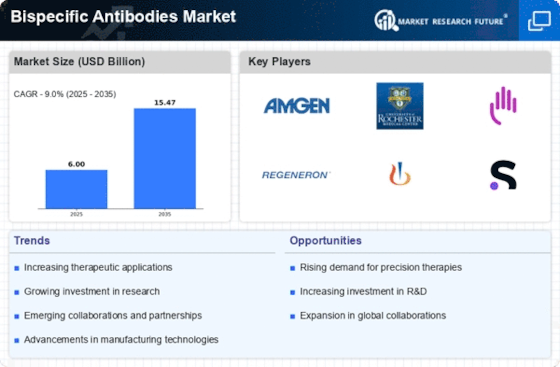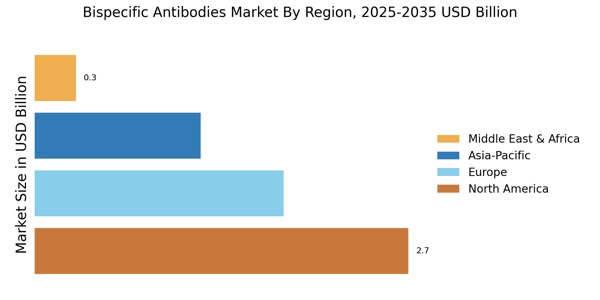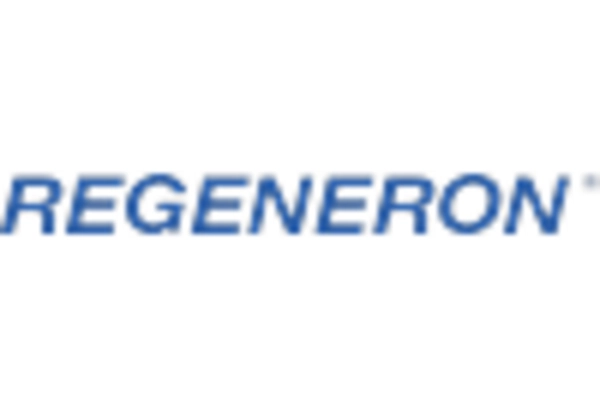Increased Investment in R&D
The surge in investment for research and development in the biopharmaceutical sector is a significant driver for the Bispecific Antibodies Market. Pharmaceutical companies are increasingly allocating resources to explore the therapeutic potential of bispecific antibodies, recognizing their ability to address unmet medical needs. In 2025, it is anticipated that R&D spending in the biopharmaceutical industry will exceed USD 200 billion, with a notable portion directed towards bispecific antibody development. This influx of funding is likely to accelerate the pace of innovation, leading to the introduction of new bispecific therapies that could transform treatment paradigms across various diseases, thereby enhancing the Bispecific Antibodies Market.
Rising Prevalence of Cancer
The increasing incidence of cancer worldwide is a primary driver for the Bispecific Antibodies Market. As cancer remains a leading cause of mortality, the demand for innovative therapeutic options is surging. Bispecific antibodies, which can simultaneously target multiple antigens, offer a promising approach to enhance treatment efficacy. According to recent estimates, the cancer therapeutics market is projected to reach approximately USD 200 billion by 2025, with bispecific antibodies playing a crucial role in this growth. The ability of these antibodies to engage the immune system more effectively than traditional monoclonal antibodies is likely to drive their adoption in oncology, thereby propelling the Bispecific Antibodies Market forward.
Advancements in Biotechnology
Technological innovations in biotechnology are significantly influencing the Bispecific Antibodies Market. The development of novel engineering techniques, such as dual-targeting strategies and improved production methods, has enhanced the efficacy and manufacturability of bispecific antibodies. These advancements enable the creation of more stable and effective therapeutic agents, which are essential for addressing complex diseases. The market for biopharmaceuticals is expected to grow at a compound annual growth rate of over 8% through 2025, with bispecific antibodies being a key contributor. As research continues to unveil the potential of these innovative therapies, the Bispecific Antibodies Market is poised for substantial expansion.
Growing Demand for Targeted Therapies
The shift towards personalized medicine and targeted therapies is driving the Bispecific Antibodies Market. Patients and healthcare providers are increasingly seeking treatments that are tailored to individual disease profiles, which bispecific antibodies can provide through their dual-targeting capabilities. This trend is particularly evident in oncology, where precision medicine is becoming the standard of care. The market for targeted therapies is projected to grow significantly, with bispecific antibodies expected to capture a substantial share due to their unique mechanism of action. As the healthcare landscape evolves, the Bispecific Antibodies Market is likely to benefit from this growing demand for more effective and personalized treatment options.
Regulatory Support for Innovative Therapies
Regulatory agencies are increasingly supportive of innovative therapies, which is positively impacting the Bispecific Antibodies Market. Initiatives aimed at expediting the approval process for novel biopharmaceuticals are encouraging companies to invest in bispecific antibody development. The introduction of programs such as breakthrough therapy designations and accelerated approval pathways is facilitating faster access to the market for these therapies. As regulatory frameworks adapt to support innovation, the Bispecific Antibodies Market is expected to experience accelerated growth. This supportive environment not only enhances the likelihood of successful product launches but also fosters a climate of innovation that is essential for the advancement of bispecific antibody therapies.

















